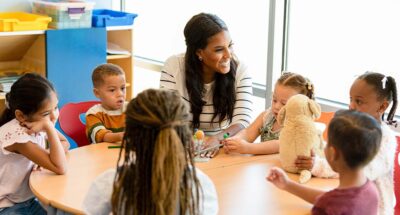
Say “We” to Nurture Collaboration in Students
Use language that encourages a sense of connection and collaboration to encourage cooperation among students.

Use language that encourages a sense of connection and collaboration to encourage cooperation among students.
Teachers will:
From a very young age, children start learning how to collaborate and what it means to make commitments to others. Even as early as toddlerhood, children have expectations of their peers to stick around and cooperate when they’re engaged in a collaborative game or activity.
It turns out that the way we talk to children can influence their feelings around collaboration and about each other.
When you invite multiple students to participate in an activity—even when they’ve just met one another—replace “you” language with “we” language. For example, rather than saying something like “What game do you want to play?” or “You are going to help decorate for your play tonight,” try saying something like this: “We are going to help decorate for our play tonight” or “It’s time for us to play a fun game! What do we think we should play?”
This subtle shift in language can help students feel more committed to each other when they’re doing activities together, setting a good foundation for collaboration and cooperation.
Jared Vasil, Duke University
Michael Tomasello, Ph.D., Duke University and Max Planck Institute for Evolutionary Anthropology
Preschoolers between three and four years old were randomly assigned to one of two collaborative play activities with an Eeyore puppet: One activity involved Eeyore talking to the child using first-person plural pronouns (e.g., “Some friends are going to have a party later. They want help decorating for the party. So, we are going to help decorate. We can help decorate by decorating this colorful paper…”). In the other activity, Eeyore used second-person singular pronouns (e.g., “you” and “your”) rather than “we” and “our.”
The study found that children who heard “we” language felt a greater sense of commitment to their puppet partner compared to those who heard “you” language. Although results for levels of sharing did not reach statistical significance, they trended in the predicted direction, such that children shared more when they heard “we” language.
Collaboration can be hard for students (and adults). Working together to get something done involves navigating different perspectives and priorities. Students can be reluctant to engage in cooperative activities because they want to avoid disagreements and arguments with others.
Using “we” language can help your students have positive collaborative experiences, which heightens their awareness of their own capacity to work and play with others. They can learn how to resolve conflicts and work cooperatively rather than competitively, which can help them make progress toward both their shared and personal goals.
Positive cooperative interactions can also help students view each other as a committed partner or teammate upon whom they can rely. While the strength of friendships depends on many factors, cooperation is an important part of being able to make and keep friends during childhood.

Do you want to dive deeper into the science behind our GGIE practices? Enroll in one of our online courses for educators!
Comments